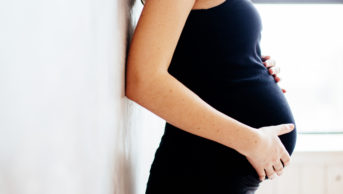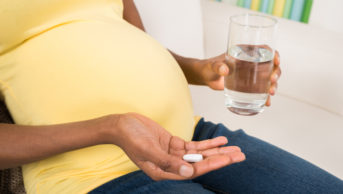
Alfred Pasieka / Science Photo Library
Vitamin D supplements taken by pregnant women have no significant effect on the bone strength of their babies, according to the results of a study published in The Lancet Diabetes and Endocrinology
[1]
on 1 March 2016. However, an analysis of the data suggests that vitamin D supplements taken by mothers whose babies are born in winter months may be beneficial.
Researchers recruited 1,134 women who were between 14 and 17 weeks pregnant from Southampton, Oxford and Sheffield who had serum levels of vitamin D that were between low and normal. Some 565 women took 25µg of vitamin D daily (as cholecalciferol 1,000 IU/day) until they delivered while another 569 took a placebo for the same length of time.
UK government guidelines recommend all pregnant women take a daily supplement of 10µg of vitamin D to improve their babies’ bone health, so researchers were keen to discover the efficacy of the supplement.
The researchers found that the bone mineral content (BMC) of infants born to mothers who took cholecalciferol 1,000 IU/day, measured within two weeks of birth, was no different to that of infants born to mothers in the placebo group (mean 61.6g [95% CI 60.3–62.8] vs 60.5g [59.3–61.7], respectively; P=0.21).
However, in a sub-analysis they found a link between the treatment group and the BMC of babies born in winter months. The effect of treatment was substantially greater for winter births (mean difference in BMC between treatment groups of 5.5g [95% CI 1.8–9.1]; P=0.004) than for other seasons. The BMC results were similar in each of the three winter months.
“[The study] has given us the first evidence that supplementing mothers with vitamin D during pregnancy counteracts the seasonal drop in maternal vitamin D levels and may help to ensure good bone development in these winter births,” says co-author Nicholas Harvey, professor of rheumatology and clinical epidemiology at the MRC Lifecourse Epidemiology Unit at the University of Southampton.
When the researchers looked at the average serum vitamin D concentration at 34 weeks’ gestation (measured as 25-hydroxyvitamin D), they found it was significantly higher in the women who received cholecalciferol (67.8 nmol/L [standard deviation 22.1]) compared with those women in the placebo group (43.3 nmol/L [22.3]; P<0.0001).
They then went on to consider the effect of cholecalciferol on vitamin D levels in women according to the season of their baby’s birth. They found that the decline in serum vitamin D from 14 weeks’ to 34 weeks’ gestation noted in women in the placebo group who delivered in winter and spring was not evident in the women, delivering in these same months, who received cholecalciferol.
“Overall, we found no effect of maternal supplementation with cholecalciferol 1,000 IU/day during pregnancy on the primary outcome of offspring neonatal BMC. However, the intervention clearly achieved maintenance of vitamin D repletion, and was safe,” the researchers say.
They add that the finding of an interaction between treatment effect and season of delivery is “consistent with previous data and biologically plausible, and suggests the potential for beneficial effects of supplementation in pregnant women due to deliver in winter months”.
The findings were welcomed by Arthritis Research UK. Stephen Simpson, director of research programmes at the charity, says: “This is an important study which shows that vitamin D supplementation for pregnant women can help increase bone strength in children born in winter months.”
He points out that strong bones in childhood is likely to reduce the risk of osteoporosis and fractures later in life, which can lead to disability and loss of independence.
References
[1] Cooper C, Harvey NC, Bishop NJ et al. Maternal gestational vitamin D supplementation and offspring bone health (MAVIDOS): a multicentre, double-blind, randomised placebo-controlled trial. The Lancet Diabetes Endocrinol 2016. doi: 10.1016/S2213-8587(16)00044-9


